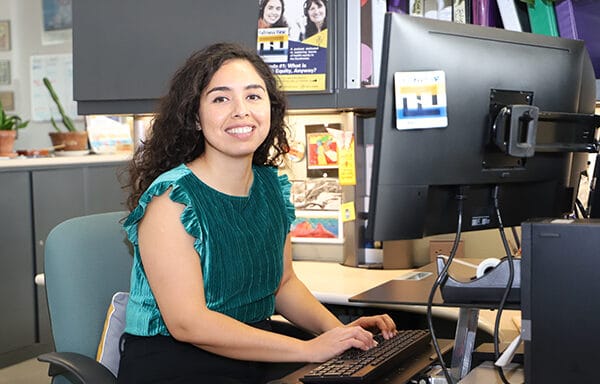When Alexandra Samarron Longorio was in her early 20s, as a former undocumented student, she saw that attending college in the United States was an almost impossible task for undocumented students.
A first generation college student of a single mother, Samarron was determined to thrive and, along with other undocumented students, to find higher education opportunities for everyone regardless of immigration status.
The task was not easy. Each year, 98,000 undocumented students in the United States graduate from high school, and more than 2,000 undocumented students graduate from Arizona schools, according a 2019 study published by the Migration Policy Institute.
In 2009, Samarron worked together with five other undocumented students and educators at Pima Community College and the University of Arizona to create ScholarshipsA-Z, an immigrant, youth-led organization in Tucson that assists undocumented youth and their families with scholarship opportunities and leadership trainings. The program is still a vital part of the Tucson community more than 10 years later.
“I valued so much working with other undocumented immigrants — that gives me a lot of energy, and so it has been empowering,” Samarron said of the work required to found ScholarshipsA-Z. “I am close friends with that first group of undocumented students (ScholarshipsA-Z founders). When you come together as a community that is suppressed, you learn the power in finding solutions together. It is beautiful.”
While earning her bachelor’s in nutritional sciences from UA, Samarron worked as a research assistant on a project with primary investigator Sofia Gomez called “DACAmented Voices in Healthcare.”
“That project was more focused on community based participatory research using Photovoice,” Samarron said. “It examined how Arizona’s restrictive immigration policies impact health status of undocumented youth who were DACA (Deferred Action for Childhood Arrivals) recipients.
After her experience with the project, Samarron said she was inspired and knew she wanted to work on addressing health equity issues.
“It introduced me to what public health is,” she said. “I felt like as a Mexican immigrant I could also be part of public health. It was validating to learn from a Latinx researcher and participants. It was very empowering to see myself reflected in the discipline.”
After graduation, Samarron entered UA’s Individualized Supervised Practice Pathway, a dietetic internship to become a registered dietitian.
Making a difference in Flagstaff
Samarron moved to Flagstaff in 2018, and she joined Northern Arizona University’s Center for Health Equity Research (CHER), where she now works as a senior research coordinator for the Southwest Health Equity Research Collaborative’s Community Engagement Core. She is one of the co-hosts of the center’s seminal podcast, Fairness First, which explores health equity issues with guests from the community as well at NAU.
While working full time for CHER, Samarron is also finishing a Master in Public Health in NAU’s Department of Health Sciences. Samarron’s Master in Public Health project focuses on how hotel practices, policies and procedures impact the eating habits and hydration of Latina immigrant hotel housekeepers.
“My project shows how hotels implement exploitive practices preventing housekeepers from adequate dietary intake, which is detrimental to their health over time,” Samarron said. “It is important to understand how institutions that employ immigrants and people of color, especially in time of COVID-19, are caring for workers.
Overall, my project attempts to pose the question of how can institutional policies and community care not depend on the exploitation of health and life, especially from low wage workers?”
She also helped to establish Aqui Entre Nos — Just Between Us, a CHER initiative focused on wellness and health project for hospitality workers, in collaboration with hotel housekeepers, CHER researchers, other NAU MPH students and Samantha Sabo, associate professor in the Department of Health Sciences and CHER.
“Alexandra is a transformative public health leader,” said Sabo. “Cultivating community knowledge to learn how best to challenge inequity and right the unjust and unfair practices and policies that cause health disparities is what she does best. She holds public health and research accountable to community and has made all of us in CHER better community engaged scholars and partners.”
Sabo said that Samarron’s choice to become a registered dietitian is just one example of how she “breaks barriers and challenges spaces lacking Latinx immigrant experience and perspective.”
“Alexandra has taught so many people in her life, and especially me, to recognize our various forms of power and privilege – and the responsibility we all have to use these super powers for the good of all humanity,” Sabo added.
Samarron said she hopes to one day bring together her dietetics’ training with her public health work.
“I think I’m still ruminating about how I can use the formalized training in nutrition I have with my knowledge in public health,” Samarron said. “I would like to explore combining my work as a registered dietitian to engage in community grounded public health approaches.”
